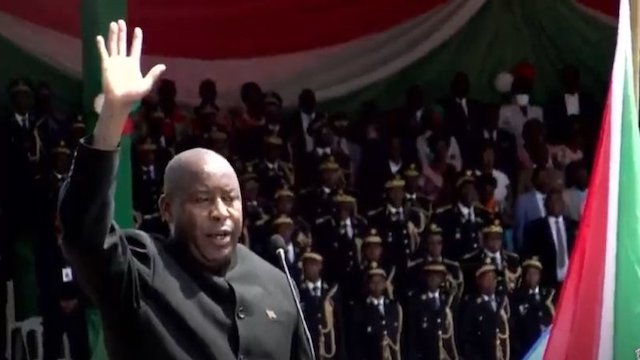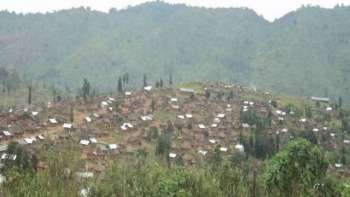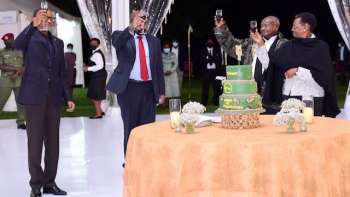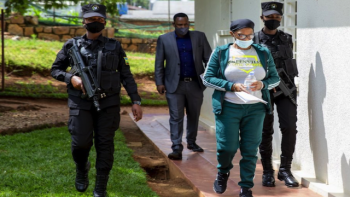General Evariste Ndayishimiye, the newerly democratically elected President of the Republic of Burundi was sworn in on Thursday June 18, 2020. He is the 10th President to rule the country. One of the freedom fighters who liberated Burundians from years of oppression, he succeeds his former companion, Pierre Nkurunziza who passed away on June 8, 2020 (see AfroAmerica Network)
In Ingoma stadium in Gitega, President Evariste Ndayishimiye was sworn in, in accordance with article 107 of the Constitution, to serve a mandate of seven years, standing, the national flag and that of national unity in the left hand, the right hand lifted. "Before God the Almighty, before the Burundian people, the only holder of national sovereignty, me, Évariste Ndayishimiye, president of the Republic of Burundi, I swear loyalty to the Charter of National Unity, to the Constitution of the Republic of Burundi, and the law, " he recited.
The tenth president of Burundi begins on Thursday, June 18, a mandate of seven years.
Elected on May 20, 2020 he was initially due to take office on August 20, 2020 at the end of Pierre Nkurunziza's term. The sudden death of the latter on June 8, at the age of 55 after 15 years in power, officially of cardiac arrest, changed the situation.
To avoid uncertainty and a period of confusion, that could have destabilized Burundi,the ruling party, the CNDD-FDD , decided to speed up the transition process and asked the Constitutional Court to rule on the request to have a quick transition. The Constitutional court ruled and the executive power ordered that Évariste Ndayishimiye begins his seven-year term as soon as possible, without an interim period.
Dressed in a black suit, he entered the stadium, surrounded by his presidential guard. The ceremony began with the prayers of representatives of the Catholic, Anglican and Muslim religions in Burundi. And when it came time for the president to go to take the oath, he first started walking into the stadium, and this is the first time that it happened, he knelt on the red carpet.
Several influential people and dignitaries from Burundi stood around him and one of them, Monsignor Simon Ntamwana, bishop of the Catholic church, prayed for him. Bishop Simon Ntamwana, an influential figure of the politics in Burundi who had pushed for democratic transition, addressed President Evariste Ndayishimiye in these terms:
"You can bring peace among Burundians because you know how much it is needed. May the Lord God enlighten you and help you to lead Burundi in harmony and to develop this country, to build a reconciled society, to repatriate all the refugees, may Burundian intellectuals who are abroad return despite the poverty that characterizes this country in order to help develop their country, and may God help you reconnect with the international community. "
Responding to the Bishop and addressing the packed stadium, the new president said: "Do not be afraid because I know what awaits me. I come to strengthen the independence and sovereignty of Burundi, the freedom of all Burundians and to protect them in their dignity. Let the international community no longer interfere in these kinds of issues as it used to do for other reasons, because that is my concern." He also called on the refugees to come back and said: "come back if you want and we are here to listen to you "
He put forward an ambitious development and social agenda, including education, healthcare, energy, job creation, and many more.
Following the death of Pierre Nkurunziza, who had presented him as his "heir", General Evariste Ndayishimiye undertook to "continue his work". President Évariste Ndayishimiye reiterated the commitment to continue the work of his predecessor Pierre Nkurinziza, to whom he payed a tribute.
Evariste Ndayishimiye, 52 years old, was born 1968 in Giheta, Burundi. He attended the University of Burundi, where he began the studies of law. He was still studying in 1995 when Hutu students were massacred as part of the inter-ethnic violence which accompanied the Burundian Civil War (1993–2005). He fled and joined the rebels, known as National Council for the Defense of Democracy – Forces for the Defense of Democracy (Conseil National Pour la Défense de la Démocratie – Forces pour la Défense de la Démocratie, CNDD–FDD). He rose up the ranks of the CNDD-FDD during the civil war, leading the military operations and gaining the nickname "Neva", for his bravery.
















